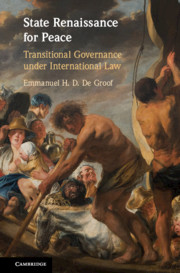Book contents
- Reviews
- State Renaissance for Peace
- State Renaissance for Peace
- Copyright page
- Dedication
- Contents
- Tables
- Foreword
- Preface
- Acknowledgements
- Additional material
- Abbreviations
- Introduction Transitional Governance Today
- Part I The Unchartered Territory of Transitional Governance
- Part II Foundation and Actors of Transitional Governance * Sources of Ius in Interregno
- Part III Self-Determination through Transitional Governance
- Part IV Moderating External Influence on Transitional Governance
- 8 Limits to External Involvement with Transitional Governance
- 9 The Inducement of Oppositional Transitional Governance
- 10 Indirect Regime Change
- General Conclusion
- Index
10 - Indirect Regime Change
A Response to Ius Cogens Violations?
from Part IV - Moderating External Influence on Transitional Governance
Published online by Cambridge University Press: 10 September 2020
- Reviews
- State Renaissance for Peace
- State Renaissance for Peace
- Copyright page
- Dedication
- Contents
- Tables
- Foreword
- Preface
- Acknowledgements
- Additional material
- Abbreviations
- Introduction Transitional Governance Today
- Part I The Unchartered Territory of Transitional Governance
- Part II Foundation and Actors of Transitional Governance * Sources of Ius in Interregno
- Part III Self-Determination through Transitional Governance
- Part IV Moderating External Influence on Transitional Governance
- 8 Limits to External Involvement with Transitional Governance
- 9 The Inducement of Oppositional Transitional Governance
- 10 Indirect Regime Change
- General Conclusion
- Index
Summary
Coercively inducing oppositional TG so as to trigger a regime change is in principle prohibited under international law. Does this hold true in the most extreme circumstances, i.e. when the incumbent power violates ius cogens? If states wish to halt gross and persistent breaches of ius cogens, they must exhaust the available multilateral fora and respond through collective non-recognition; multilateral cooperation; and peaceful settlement including by directly negotiating with the ius-cogens-violating regime committing these breaches. If these steps fail, international law does not fully rule out the possibility of inducing oppositional TG as a last resort measure. Checks and balances, both procedural and substantive, are then to become integral part of the unilateral and coercive inducement of oppositional TG. But the chances of impeccable lawfulness are quite low in light of the stringent procedures and conditions that apply, forming the basis for an obligation of strict moderation.
Keywords
- Type
- Chapter
- Information
- State Renaissance for PeaceTransitional Governance under International Law, pp. 337 - 368Publisher: Cambridge University PressPrint publication year: 2020



